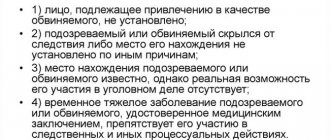When can you appeal a criminal case?
Like any other procedures in criminal proceedings, the initiation of a case must be carried out in strict accordance with the requirements of the law - the Code of Criminal Procedure and other rules. And if at least one element is violated, it becomes possible to appeal the decision to initiate a criminal case and cancel it, thereby avoiding bringing the case to court and possible unpleasant consequences. However, for an effective appeal, one of the following situations must occur:
- there were obstacles to initiating a criminal case - there are a number of restrictions on opening a case, including the expiration of statutes of limitations, amnesty for the accused, insufficient age for criminal liability, etc., which directly prohibit initiating criminal proceedings. If the case is open, the decision can be successfully appealed;
- the established procedure for initiating criminal proceedings was not followed - the entire pre-trial investigation procedure, including the decision to open a case, must be carried out in strict accordance with current legislation. Recorded deviations and violations are grounds for appeal against the initiation of a case;
- lack of corpus delicti or insufficient justification - a criminal case must be initiated on the basis of a proven fact of an offense and evidence obtained legally. If the investigation does not have enough such evidence, the accused can appeal the initiation of the case.
In addition to the above, the basis may be the incompetence of law enforcement officers who opened the case, personal hostility, conflict of interest, etc. - in a word, any circumstances that can be interpreted in favor of the accused. Therefore, the participation of a lawyer before the initiation of a criminal case is very important - he will be able to select a suitable basis for an appeal.
Grounds for refusal
An exhaustive list of reasons for rejecting a request to open a case is set out in Art. 24 Code of Criminal Procedure.
The reasons are:
- Absence of the very fact of an illegal act. It says that the circumstances pointed out by the applicant do not exist.
- Expiration of the statute of limitations for prosecution. The period depends on the complexity of the crime and the severity of the consequences. According to Art. 78 of the Criminal Code, the period varies from 2 to 15 years.
- Absence of corpus delicti in the offense. In this case, the fact of illegal actions has been established, but it cannot be qualified as a criminal act.
- Death of the suspect or culprit. Eliminates the very possibility of punishing the person responsible for the incident. The exception is the need for rehabilitation of the deceased.
- Lack of communication from the victim in circumstances where it is a private-public or private accusation.
In practice, approximately 1/3 of negative verdicts are made prematurely, in violation of the law. There are often denials of applications based on fraud.
For example, the consideration of an appeal with a request to prosecute a colleague who borrowed a large amount to purchase real estate led to an unsatisfactory result. The condition of the loan was that the funds would be repaid within a year. However, the debtor quit and disappeared. It turned out that he did not purchase the property, but at the same time received similar loans from other acquaintances, which he never repaid.
Based on the indicated appeal, the authorized person issued a refusal verdict, motivated by the existence of civil legal relations between the applicant and the debtor, which exclude criminal proceedings. Such a decision cannot be called legal, because from the circumstances it follows that the borrower did not initially intend to repay the funds, and this directly indicates deception. The corpus delicti in this case is provided for in Art. 159 of the Criminal Code on fraud.
Where to go to appeal a criminal case?
One of the main questions that worries people in such situations is: where to go to appeal the initiation of a criminal case? After all, a complaint to higher authorities does not look very reliable: most likely, management will not want to understand the actions of their subordinates, and the decision will remain in force. According to the Criminal Procedure Code, a person against whom a criminal case has been initiated has two options - extrajudicial and judicial appeal. Let's take a closer look at each of the options.
Is it possible to appeal the initiation of a criminal case without going to court? Yes, of course, there is such an opportunity, but you won’t have to communicate with the investigator or his superiors. To do this, you need to file a complaint with the prosecutor at the place where the case was opened. However, it is also possible to file a complaint with the head of the investigative agency, but the likelihood of its satisfaction is very low. The prosecutor must respond to the complaint within 3 days (in some cases, if additional action is required, up to 10 days), and if the argument is convincing, the decision may be in favor of the accused.
However, in practice, out-of-court appeal is used quite rarely as it is ineffective, and it is better to immediately go to court. It is also possible to go to court after receiving a refusal from the prosecutor or the head of the investigative body. A complaint is filed with the court of general jurisdiction at the place of registration of the accused. The appeal must be considered by the court no later than 5 days after receiving the complaint. The exact time is communicated when filing an application at the court office.
Registration of the resolution
Refusal to open a case requires appropriate registration. First of all, materials obtained during the inspection are recorded in the appropriate journal. They are assigned an individual number. After which the data is sent to the archive.
In this case, upon the fact of a negative decision, the investigator or inquiry officer prepares a resolution. According to paragraph 4 of Art. 148 of the Criminal Procedure Code, a copy of it must be sent to the applicant within 24 hours after registration.
A corresponding notification is also sent to the citizen. The document must contain legal grounds for refusal, references to legislative acts, as well as explanations regarding the possibility of appealing the verdict.
Question:
What to do if a copy of the decision is not received?
Answer:
First of all, you need to call the duty department and find out at what stage of the inspection a specific situation is. You will need to provide the application registration number indicated in the notification coupon. If a decision on the issue has already been made, but the citizen has not seen a copy of the decision, then he should pay a visit to the responsible official. His name, surname and position can also be found on the coupon. The authorized employee is required to provide the document upon first request. Refusal to issue a copy is interpreted as inaction of a police officer. In this case, you can complain about him to the prosecutor's office.
Procedure for considering a complaint about a crime
How and within what time frame should your criminal complaint be processed? The answer to this question can be found in Art. 144 of the Code of Criminal Procedure of the Russian Federation, which reads as follows:
- Officials are required to accept all statements about any crimes committed or being prepared;
- The information provided by the applicant must be verified no later than 3 days from the date of acceptance of the application;
- The applicant must be issued a document confirming the acceptance of the crime report, indicating information about the person who received it, as well as the date and time of its acceptance;
- Refusal to accept a message or to initiate a criminal case may be appealed to the prosecutor or to the court.
Appeal: the essence of the procedure and the content of the complaint
In case of disagreement with the decision, it can be appealed on the basis of Art. 123 Code of Criminal Procedure. There are no time limits - you can take measures to protect your rights at any time.
It is worthwhile to first study the materials of the control carried out by an employee of the authorities. To do this, a request is sent to the head of the relevant department. As a result, the applicant is assigned a time and place to review the documents.
Important! During the familiarization process, it is advisable to make copies of documents using a copier, camera, or scanner. In the future, they can be used as arguments indicating the illegality of the actions of officials. To avoid difficulties, it is recommended to mark the need to use technical means in the mandatory application.
After studying the data, you can begin preparing a complaint. You can draw it up either personally or using the services of a lawyer.
A standard sample document contains information:
- name, address of the structure to which the appeal is sent;
- Full name, address of the applicant;
- negative resolution number;
- the applicant’s arguments, supported by copied materials and references to legislation;
- requirements - cancellation of the verdict, additional control, commencement of proceedings, consideration of the actions of officials and the imposition of punishment on them;
- date, signature.
In the petition, it is important to emphasize the prematureness of the refusal decision, and an insufficiently in-depth study of the facts and information. You can also focus on a vague statement of reasons why a negative verdict was made.
It is also necessary to reflect in the appeal your own conclusions arguing the illegality of the activities of the investigator or interrogating officer.
Who can report a crime that has been committed or is being prepared?
Anyone can talk about a crime committed or being prepared - regardless of gender, age, citizenship, place of residence, official status and financial wealth. That is, if you have become a victim of theft or a witness to a murder, you have every right to contact law enforcement authorities with an appropriate statement. However, there are exceptions to this rule. In Art. 20 of the Code of Criminal Procedure of the Russian Federation specifies a number of articles, cases under which are initiated only at the request of the victim:
- Rape (Part 1 of Article 131 of the Criminal Code of the Russian Federation);
- Libel (Part 1 of Article 128.1 of the Criminal Code of the Russian Federation);
- Battery by a person subjected to administrative punishment (Article 116.1 of the Criminal Code of the Russian Federation);
- Violation of copyright and related rights (Part 1 of Article 146 of the Criminal Code of the Russian Federation);
- Violation of inventive and patent rights (Part 1 of Article 147 of the Criminal Code of the Russian Federation);
- Violation of the inviolability of the home (Part 1 of Article 139 of the Criminal Code of the Russian Federation);
- Violation of privacy (Part 1 of Article 137 of the Criminal Code of the Russian Federation);
- Violation of the confidentiality of correspondence, telephone conversations, postal, telegraph or other messages (Part 1 of Article 138 of the Criminal Code of the Russian Federation);
- Violent acts of a sexual nature (Part 1 of Article 132 of the Criminal Code of the Russian Federation);
- Unreasonable refusal to hire or unjustified dismissal of a pregnant woman or a woman with children under 3 years of age (Article 145 of the Criminal Code of the Russian Federation);
- Beatings (Article 116 of the Criminal Code of the Russian Federation);
- Intentional infliction of minor harm to health (Part 1 of Article 115 of the Criminal Code of the Russian Federation).
It is worth noting that a criminal case for any of these crimes can be initiated in the absence of a statement from the victim. This is possible if a crime is committed against a person who, due to a dependent or helpless state or for other reasons, cannot defend his rights and legitimate interests.
How to write a report about a crime?
Since the law does not provide for a single template, a statement of crime is drawn up in any form. The application must indicate:
- Applicant's details (an anonymous statement of a crime cannot serve as a basis for initiating a criminal case);
- Information about a crime committed or being prepared;
- We request that the perpetrators be brought to justice.






